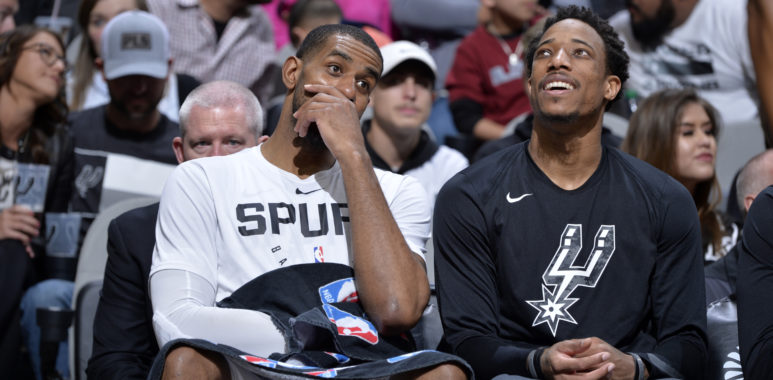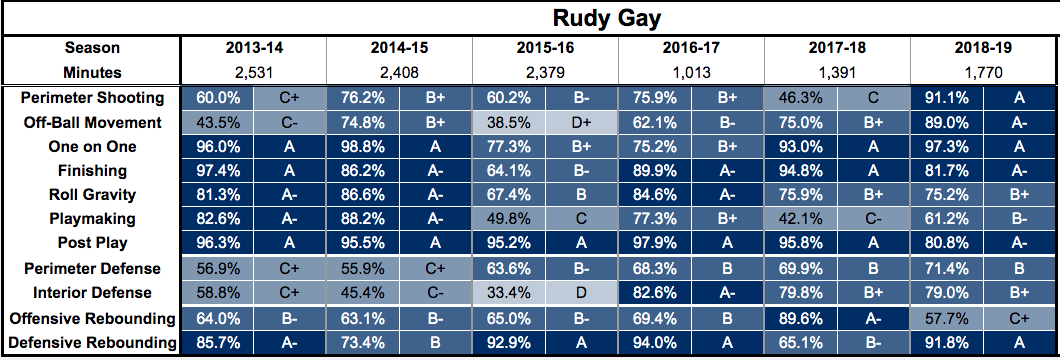
Handing Out the Spurs’ 2018-19 Awards
The 47-34 Spurs will play their season finale on Wednesday against the Mavericks. The game has significant implications on their playoff seed, which will be anything from No. 6 to No. 8 in the Western Conference.
The game is big, but the Spurs’ season is a success regardless of Wednesday’s outcome. They withstood a few key injuries and a very new roster with some significant limitations to compete admirably in a deep Western Conference.
Let’s hand out awards to some of the Spurs players who played key roles in the story of this season.
Most Improved Player: Rudy Gay
Gay had a decent season for the Spurs last year. Granted, he missed 25 games due to injury and only averaged 21.6 minutes per contest, but he was fine when he was on the floor. He provided vital individual scoring to a team that needed it, but he didn’t really play enough minutes or well enough to move the needle.
Gay has been much better this season on the strength of two big skill improvements: perimeter shooting and playmaking. An offseason without Achilles surgery rehab clearly helped him prepare for the campaign. Check out the progression of his BBall Index talent grades from 2017-18 to 2018-19:

Gay’s improved outside touch has made him a much better fit with non-shooting starters like DeMar DeRozan and LaMarcus Aldridge. His improved playmaking has been helpful in lineups where he’s the main offensive creator next to four bench guys (often Patty Mills, Marco Belinelli, Davis Bertans and Jakob Poeltl).
Overall, comparing regular seasons, he’s played 583 more minutes than last year. Gay’s Player Impact Plus-Minus shot up from minus-0.15 to plus-1.69. If the 2018-19 Spurs had 2017-18 Gay instead of this year’s Gay, they’d definitely be worse.
Bryn Forbes and Derrick White are defensible, and maybe more common, picks for this award if you were to poll Spurs fans. Forbes has become a more well-rounded scorer and upped his shooting efficiency in a bigger role. White has gone from an Austin Spurs fixture to a very solid two-way starter.
However, Forbes’ biggest weaknesses of finishing, rebounding and defense still remain. Among wing with 1,000 minutes this season, he’s in the 25th percentile or lower in all five BBall Index talent categories encompassed by those three skills.
With White, it’s just hard to know what his baseline level of play was last year. He usually played in garbage time and only logged 139 minutes.
Sixth Man of the Year: Davis Bertans
The Spurs again had a strong bench this season. Gregg Popovich always prioritizes chemistry, basketball IQ and clearly defined roles with his bench players.
Bertans, Jakob Poeltl, Patty Mills and Marco Belinelli are the only eligible players with a real shot at this award. All four did a fantastic job cultivating the Spurs culture with teamwork and great ball and player movement.
Bertans takes the prize, though, for being a positive contributor on both sides of the ball.
From December 1 to January 1, Bertans shot 38-of-67 from three (56.7 percent). That was never going to last, but he’s still shot a very strong 39.5 percent from deep in all other games. He consistently terrifies teams with his presence off the ball.
Bertans grades as a “C” perimeter defender and “B” interior defender leaguewide. That’s considerably better than the versatility Mills and Belinelli have to offer. Poeltl’s defensive grades are slightly better, but he’s not nearly the threat on offense that Bertans is.
Impact-wise, Bertans actually ranks first on the team in PIPM (plus-2.33). He’s obviously not truly the Spurs’ MVP because of his low minutes (21.5 per game) and the fact that he’s impactful in a smaller role on both ends of the floor.
However, it does give a strong insight into the sort of impact an elite three-point shooter with decent defensive versatility can have in today’s NBA.
Most Disappointing Player: Pau Gasol
The Spurs had 10 players with at least 900 minutes of court time this year. All of them either performed very close to expectations or overachieved. So I guess it’s a good thing that we have to dig a bit here to tab Gasol, who played 330 minutes with San Antonio and isn’t even on the team anymore.
Gasol’s advanced metrics weren’t bad. He had a plus-0.91 Player Impact Plus-Minus for the Spurs this season, which is actually a solid sixth on the team.
But there’s more context that is necessary to include.
Most of Gasol’s best moments (and minutes, in general) came against weaker competition. He played only eight games against teams with records equal to or better than San Antonio’s, and his per-game numbers in those contest were as follows:
2.8 points, 3.1 rebounds and 1.3 assists in 10.1 minutes with 50.8 true-shooting percentage
When Gasol returned from his foot injury at the beginning of January, Gregg Popovich tried to squeeze him into the rotation many times. Gasol struggled to find his place in the offense and was targeted frequently on defense with his lack of speed. His passing and defensive rebounding were strengths (86.8 and 98.7 percentiles with BBall Index’s talent grades), but he tailed off tremendously both as an outside shooter and interior scorer.
Mainly, though, he disrupted the on-court chemistry the rest of the team was building in December.
Ultimately, the Spurs realized Gasol wasn’t part of their plans for this year and negotiated a buyout, allowing him to sign in Milwaukee. We all knew Gasol was declining. But the combination of his $16 million salary this year and the massive dip in impact earns him this spot.
Defensive Player of the Year: Derrick White
Who else would this be? White is the obvious choice with his activity, quickness and length at the point of attack.
He’s the only guard in the NBA this season averaging at least 1.8 steals and 1.3 blocks per 100 possessions. The block numbers are especially intriguing since he didn’t register his first block this season until his 22nd game. He’s been a serial swatter since then, though.
No NBA guards contests more shots per game (9.4) than White, despite his mere 25.8 minutes per game, so the blocks should come as no surprise.
A few weeks ago, Pounding the Rock’s Charlie O’Charles put together several of White’s top defensive plays. He’s just a pleasure to watch on defense.
White’s talent grades in perimeter (71.9) and interior defense (58.9) aren’t awe-inspiring. But he checks the opponents’ best perimeter player every game. It a task he performs well and that no one else on the roster is capable of fulfilling consistently. It’s no wonder his Defensive PIPM is plus-2.06, which is first both on the Spurs and among NBA point guards.
The biggest remaining issue for White is foul trouble. He bites on shot fakes and defends a bit too demonstratively on drives sometime.
But still, White and Dejounte Murray are going to be one heck of a defensive duo in the backcourt next year.
Most Valuable Player: LaMarcus Aldridge
Here are LaMarcus Aldridge’s numbers since November 24 this season:
22.0 points, 8.4 rebounds, 2.4 assists, 1.4 blocks and 1.7 turnovers in 32.4 minutes per game on a 60.2 true-shooting percentage, 5.37 PIPM wins added (first on the Spurs in that timeframe)
We can’t totally ignore Aldridge’s bad start to the season. But the fact that he’s been so solid for the final 80 percent of the season is important here.
DeRozan slumped about eight weeks between Christmas to right after the All-Star break and just has been less efficient overall, even though his playmaking has been absolutely huge this season. Rudy Gay and Derrick White are limited in this discussion by injury and not enough offensive volume.
But Aldridge has rightfully taken this spot as his own. His body of work doesn’t quite measure up to last season’s performance, and his All-Star spot is still pretty controversial, but it’s been a strong campaign.
He’s been a well-rounded contributor to the Spurs. In BBall Index’s talent grades, his perimeter shooting is in the 18th percentile. However, he’s in the 70th percentile or above in off-ball movement, one-on-one play, finishing, roll gravity, playmaking, post play, interior defense, offensive rebounding and defensive rebounding.
Aldridge’s willingness to play a lot more center this season has made the Spurs more modern on both sides of the ball. He’s been a strong screener and roller. He also bumps bodies down low to fight for deep post position. Foul trouble is rarely an issue for him.
Without Aldridge, the Spurs would have a significant interior scoring and defending void. Aldridge and Poeltl getting all 48 minutes at the 5 spot is so, so much better than some combination of Poeltl, Gasol and a bit of Drew Eubanks and Chimezie Metu.
Congratulations, LaMarcus.
Note: All stats are from NBA.com, Basketball-Reference or BBall Index, unless otherwise indicated.
